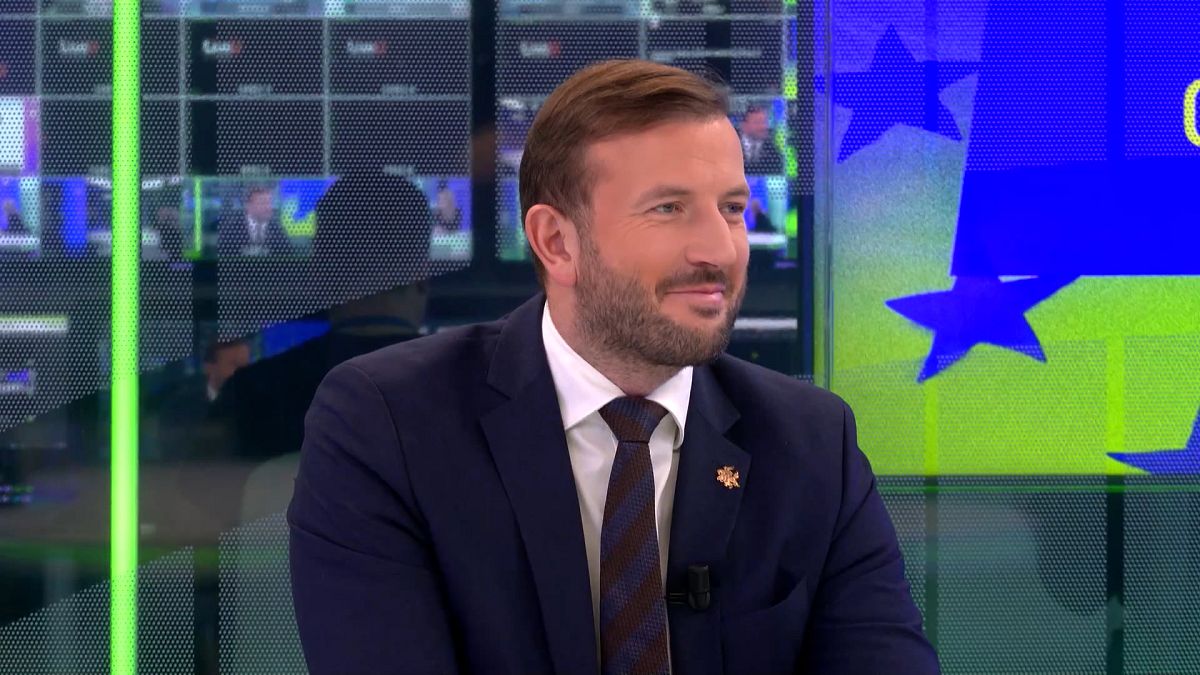Deregulating green policies jeopardises Europe’s competitiveness

The opinions expressed in this article are those of the author and do not represent in any way the editorial position of Euronews.
Of course, more needs to be done to promote European industry. But retreating from the vision of the Green Deal is not the answer, Mats Engström writes.
The relationship between competitiveness and the ambitions of the European Green Deal is currently high on the EU agenda.
The bloc’s flagship policy is presently facing a barrage of attacks, not just from farmers, who have taken to the streets of France, the Netherlands, Germany and beyond to protest against the demands being made of them and their industry, but from leading figures within the bloc, including Belgian Prime Minister Alexander de Croo.
De Croo, like others within the EU-27, has proposed deregulating green policies, as part of a pitch to Belgium’s struggling chemical sector, which was pivotal in galvanising the Antwerp Declaration for a European Industrial Deal.
However, such a shift, and watering down of the Green Deal, carries risk.
A simplistic view is, in fact, detrimental
As Ursula von der Leyen stated, ahead of her election as European Commission President in 2019, “the European Green Deal is our [the EU’s] new growth strategy,” and green policies have already created European business opportunities.
Some, like offshore wind, are well established. Other innovations are already beginning to bear fruit, such as power transmission technologies or low-carbon steel production, including Sweden’s “green steel,” and various circular economy solutions.
Current concerns over competitiveness are understandable, especially when it comes to energy-intensive industries.
As the European Commission stated in its recent Annual Single Market and Competitiveness Report, there is much more that needs to be done — more investment in research and innovation, a better-functioning energy market, and further skills development.
But modern industrial policy cannot be about protecting every existing part of the economy. It must also create conditions for innovation and newcomers.
This is why a simplistic view of regulation can be detrimental to competitiveness. The European Commission has shown how well-designed regulation can play a key role in driving innovative green tech.
Look at how fuel consumption standards for vehicles led to new lightweight solutions, or at the rapid development of renewable energy technologies. This approach has the potential to create markets for other innovative technologies, such as low-carbon steelmaking.
The EU can’t lose its international leverage
For EU leaders, who will meet this month and in April to comb over the European Commission’s perspective, together with former Italian Prime Minister, Enrico Letta’s, upcoming report on the future of the single market, this could make for a decisive moment for green policies in the bloc — particularly if those with demands for a “regulatory break” win out.
There are several reasons for this.
First, relying solely on market-based instruments is risky. There is extensive research showing the benefits of a good policy mix for reaching climate targets.
Without EU regulation promoting electric vehicles, for example, the carbon price would need to be much higher.
Lack of regulation would increase costs for consumers, companies, and governments, forced to invest more in compensatory measures for vulnerable regions and households.
Secondly, Europe would lose international leverage. Currently, the EU sets the standards that others choose to follow — and new research from the European Commission reveals the sheer scale of this, particularly with respect to environmental legislation.
Buses around the world carrying signs proclaiming that they comply with EU emission standards, are just one example of the “Brussels effect”.
This makes EU action, at a time when it has a declining share of the world economy, so important.
By backing off now, the risk increases that Europe will be outpaced by others, and its global influence will diminish, leaving the path clear for industry in other countries to capture the growing markets for green technologies.
Fragmentation and the need for legislative guardrail
Finally, lack of regulation can be expensive. The delay in restricting highly carcinogenic polychlorinated biphenyls (PCBs) cost the EU at least €15 billion. This shows that shelving stricter EU legislation might come at a high price.
Ultimately, this speaks to the coherence of the Union itself. Common rules for new technologies are intrinsically important to the European project.
If there is a regulatory pause, member states will fill the vacuum with their own laws, fragmenting the internal market. And without good EU-wide legislation as a guardrail, there is a risk that state subsidies will not promote sufficient modernisation of the economy.
This is not to suggest that the implementation of the European Green Deal is easy. It poses a considerable challenge for member states with limited administrative capacity.
Long-term financing has yet to be secured. Reporting requirements can be overwhelming for small and medium-sized enterprises.
However, these are not reasons to abandon a robust environmental policy. Rather they indicate the need for good design of legislation and for adequate measures to be put in place to ensure regional cohesion and just transitions.
To bend away from these practices, would imperil the EU’s progress towards social and environmental objectives at risk, as well as its competitiveness.
Yes, more needs to be done to promote European industry. But retreating from the vision of the Green Deal is not the answer.
Mats Engström is a senior policy fellow at the European Council on Foreign Relations (ECFR).
At Euronews, we believe all views matter. Contact us at [email protected] to send pitches or submissions and be part of the conversation.
Source: Euro News















